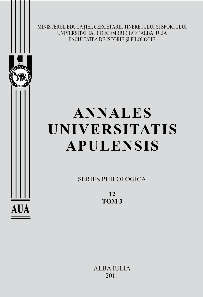„PEN Clubul Român” şi „Subsecţia Maghiară a PEN Clubului Român”
The Romanian PEN Club and the Hungarian sub-section of the Romanian PEN Club
Author(s): ENIKO OlcarSubject(s): Literary Texts
Published by: Universitatea »1 Decembrie 1918« Alba Iulia
Keywords: “PEN Club”; “Helikon group”; Romanian-Hungarian relations; cultural approach; interwar period.
Summary/Abstract: Hungarian Romanian tradition approach pre-World War period, marked by the work of Emil Isac, Octavian Goga, Ion Luca Caragiale, Ady Endre, Kuncz Aladár and others, continues in the interwar years, marking a valuable page on time axis. Passing over the social and political asperities, literature and culture have drawn the path of understanding between people of different nationalities and confessions. The press, the writers and the intellectual elite fought for a fruitful collaboration. Among the initiatives of the phenomenon of cooperation are the mutual translations, the organization of exhibitions, literary and artistic events, the creation of multilingual journals, periodicals and books reviews, the development of theatrical links under the sign of Thalia and the involvement of the cultural societies in the approach. A landmark moment of the Romanian-Hungarian cultural approach is the ,,Romanian PEN Club” program and ,,Hungarian Subsection”. ,,PEN Club” (Poetry, Essay and Novel) was founded in London in October 1921 to serve the spiritual cooperation, cultural exchange, mutual knowledge and understanding of peoples and in 1923 was founded in Romanian also. The idea of the Transylvanian Hungarian minority section dates from the group meeting ,,Helikon” in 1927. After changing the rules at the Congress in Brussels, which allowed minorities to establish separate sections in their states, negotiations began between Nichifor Crainic, Kuncz Aladár and Heinrich Zillich, involving also journalists and other writers. On 5 May 1932 the Hungarian subsection formally established at a joint meeting of Romanian and Hungarian intellectuals in Cluj. Emanoil Bucuţa then attended meetings regularly, "Helikon" on Brâncoveneşti castle. The set of cultural proximity, ,,Romanian PEN Club” and ,,Romanian PEN Club Hungarian Subsection” included a series of lectures on Hungarian Romanian literary relations, Romanian literature and art, serving as mutual knowledge and as the popularization of cultural values of ,,the other”. It had also been edited a collection of five booklets with five Romanian plays translated by Kádár Imre and performed at the Hungarian Theatre in Cluj. A failed project was the anthology initiated by Victor Eftimiu, which contained translations of the poems signed by Octavian Şireagu of 18 Hungarian poets. Although initiatives have been only partially fulfilled, in the work of the ,,PEN Club” appeared a sincere desire for cooperation between nationalities, humanism and European perspective by emphasizing the values of literature, identifying common elements, mutual translations, establishment of interference, influence and parallels between the two cultures developed in similar environment. Victor Eftimiu, Emanoil Bucuţa, Nichifor Crainic, Liviu Rebreanu and Bánffy Miklós were the ambassadors of the cultural approach, genuine examples of reason and tolerance, sensitive to weather signs and animated by the spirit of democratic and liberal attitude
Journal: Annales Universitatis Apulensis. Series Philologica
- Issue Year: 12/2011
- Issue No: 3
- Page Range: 87-98
- Page Count: 11
- Language: Romanian

